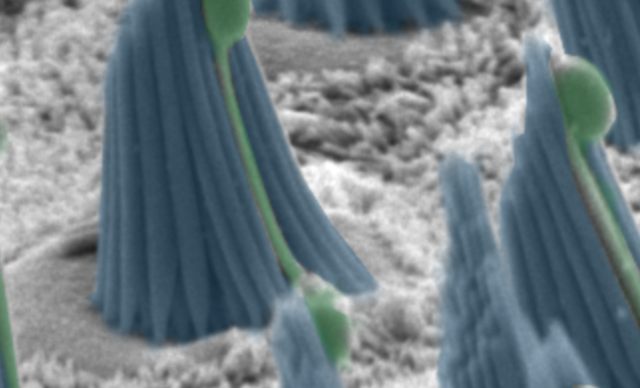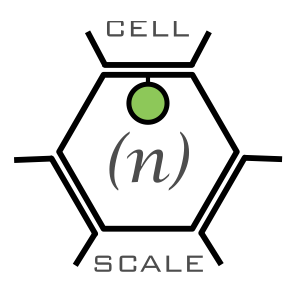Missions

A Center of Excellence for Physics and Chemistry in Cell Biology
Since 2012, the ambition of the LabEx Cell(n)Scale (named CelTisPhyBio until 2019) has been to build up a world-class Center for Physics in Cell Biology, able to partner with the most recognized institutions in the field and to train future interdisciplinary scientists. The enormous progress made in recent decades in life sciences research drastically transformed our ambitions to understand how life works. We now need to approach biological systems as dynamic entities with a spatiotemporal organization critical to their functions and tightly coupled to the physical and chemical environment in which they operate. This perception of cells as complex systems requires the integration of emergent properties at different scales and consideration of out-of-equilibrium dynamics, from molecular interactions to system heterogeneity, reinforcing the need for collaborations and interdisciplinary approaches between physics, chemistry and biology. This type of collaboration allows the development of new tools, approaches and leads to the emergence of novel concepts. Under the LabEx umbrella, the 31-member groups joined forces with one common objective: leveraging physical and chemical tools and concepts to address key biological questions on physiological and pathological cellular functions and dynamics including chromatin architecture/dynamics, intracellular trafficking & cell polarity, membrane dynamics, impacts of mechanical constraints, cell homeostasis, migration, adhesion and division. Our aim is to apply our results to gain insight into how these cellular processes are mis-regulated in cancer onset and progression and to develop new therapeutic approaches.
To do so, the LabEx Cell(n)Scale notably:
- Allowed strategic recruitments of new junior team leaders and postdoctoral fellows, reinforcing expertise and progress of research at the interface between Physics, Chemistry and Cell biology.
- Financed multidisciplinary innovative collaborative projects, including five "Groundbreaking” high-risk/high gain projects gathering several research LabEx teams/units.
- Contributed to deploy state-of-the-art technologies to keep up with evolving needs of researchers and share resources and expertise beyond the research team perimeter–supporting the development of the Institut Curie Core Technological Platforms, now part of the Core for Life alliance. The LabEx also supported the recruitment of qualified engineers and technicians, to support junior teams and ramp up the platforms.
A Center of Excellence for Interdisciplinary Training
Cell(n)Scale also improved interdisciplinary training of students and researchers by joining efforts with the Training Unit of the Institut Curie. We indeed developed training as one of our core activities:
- Organizing dedicated interdisciplinary international courses: Cell Mechanics (2013), Cellular Membrane (2014), Cell Motility (2015), Cytoskeleton in Tissue Mechanics (2016), Cytoskeleton in 3D (2017), Cell Biology and Cancer (2018, 2019), Multiscale Integration in Biological Systems (2014, 2016, 2018).
- Contributing to restructure the Master program Soft Matter and Biological Physics within the ICFP Master of physics co-organized by ENS, ESPCI and Paris-Saclay and Sorbonne Universities.
- Enabling LabEx PhD students and postdocs to learn new techniques or methods in other research laboratories and participate in international courses or conferences, by allocating grants to finance professional trips.
- Successfully taking part in two European Union’s Horizon 2020 research and innovation programs for cofunding of international PhD students (IC3i-PhD in 2015, EuReCa in 2018), coordinated by the Training Unit at Institut Curie.
- Contributing to sharing science with the general public
Enlarge the valorisation of research projects & reinforce industrial connections
Cell(n)Scale has acted–notably through its Tech Transfer & Science Coordinator, as an interface between research teams and the Institut Curie Technology Transfer and Industrial Partnerships Office (TTO), whose mission is to protect Institut Curie teams’ intellectual property, ensure transfer and develop partnerships with Biotechs and Pharmaceutical companies. The LabEx notably:
- Helped identifying research projects with high tech transfer potential
- Aided in writing pre-maturation and Proof-of-Concept (PoC) funding applications such as ERC PoC, CNRS and PSL pre-maturation or Curie Innov grants.
- Facilitated exchanges and joint projects with partners in the local or national innovation ecosystem such as PSL-Innovation & Entrepreneuriat, CNRS Life science Institute (INSB) valorization department in addition to CNRS Innovation
- Facilitated contacts with new potential industrial partners

